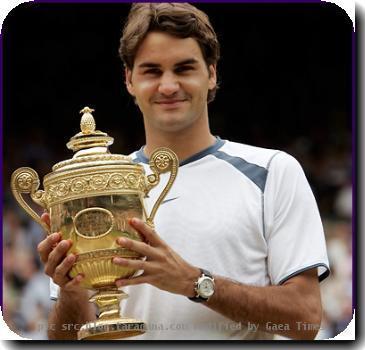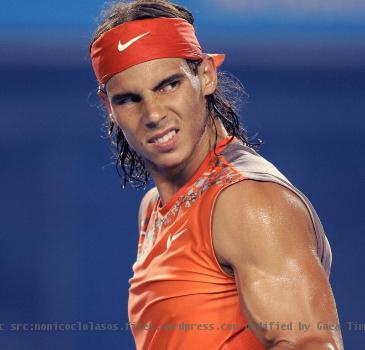Grand upset: Once so dominant at Slams, Federer loses in Wimbledon quarterfinals to Berdych
By Howard Fendrich, APWednesday, June 30, 2010
Federer upset in Wimbledon quarters by Berdych
WIMBLEDON, England — Roger Federer covered his face with both hands, no doubt wishing he were doing anything at that moment other than dissecting his latest earlier-than-expected Grand Slam exit.
This one came at Wimbledon, no less — the tournament that he loves more than any other, that he ruled for so long.
After all the victories, all the championships, all the records, Federer now must deal with a new streak: The owner of 16 major titles, the man widely considered the best player in tennis history, has lost two consecutive Grand Slam quarterfinals in the span of a month, both against opponents who have yet to win a single such trophy.
Federer arrived at the All England Club aiming to reach the final for the eighth year in a row and win a record-tying seventh title. Instead, he leaves before the semifinals, beaten 6-4, 3-6, 6-1, 6-4 Wednesday by No. 12 Tomas Berdych of the Czech Republic.
On June 1, Federer lost in the French Open quarterfinals as the defending champion there, too, putting an end to his unprecedented 23 consecutive appearances in major semifinals.
“God, I can’t wait for Paris and Wimbledon to come around next year again, that’s for sure, because they’ve been frustrating tournaments for me, even though it wasn’t too bad. Quarters is a decent result,” Federer said, as if trying to convince himself along with everyone else.
“Obviously, people think quarters is shocking, but people would die to play in quarterfinal stages of Grand Slam play,” he added, fidgeting during his news conference. “It’s not something I’m used to doing — losing in quarterfinals — because it’s not something I’ve done in the last six years.”
Indeed, he participated in 18 of 19 major finals from 2005-10. His dominance at Wimbledon is even more pronounced: Until Wednesday, Federer was 51-1 at the tournament since the start of the 2003 edition.
Federer placed at least some of the blame for this loss on two previously undisclosed health issues: a bothersome back and right thigh.
“I couldn’t play the way I wanted to play,” said Federer, whose defeat guarantees he will drop to No. 3 in the rankings for the first time since November 2003, according to the ATP. “You just don’t feel as comfortable. You can’t concentrate on each and every point, because you do feel the pain sometimes.”
He said his leg and back have bothered him since the grass-court tournament in Halle, Germany, where Federer lost to Lleyton Hewitt in the final a week before Wimbledon started. Before that match, Federer had won 76 of his last 77 matches on grass. Now he’s lost two of six.
Against Berdych, Federer whiffed on a forehand in the fourth game, but otherwise gave no obvious indication he was troubled. Berdych didn’t notice anything wrong.
“I mean, I don’t know if he just (is) looking for some excuses after the match or something like that,” said Berdych, who also beat Federer at Key Biscayne, Fla., in March, after losing to him eight times in a row.
Since winning his only 2010 title at the Australian Open in January, Federer has been to the semifinals at only three of eight tournaments. So cue all the questions about the 28-year-old’s future.
Not surprisingly, he quickly dismissed a query about whether he believes he can return to dominance, saying: “Yeah, I do think that. That’s why I’m here.”
Similar chatter arose when Federer went through — gasp! — three Grand Slam tournaments in 2008 without taking a title, losing to Novak Djokovic in the Australian Open semifinals and Rafael Nadal in the French Open and Wimbledon finals. But Federer won the U.S. Open that year, then won his first French Open title in 2009 to complete a career Grand Slam and tie Pete Sampras’ mark of 14 major titles. A month later, Federer regained his Wimbledon championship to surpass Sampras.
“When you get older and you’ve accomplished what Roger has, at some point — the guy’s a human being — he’s going to have to sort of face the fact that he’s not going to win these things and that he may never win another thing. So everyone’s sort of waiting, and predicting, when that’s going to happen,” said seven-time major title winner John McEnroe, a TV analyst for NBC. “(But) let’s not forget, that was a couple of years ago, when he lost to Nadal in the final here: It was over. He was done. He’s a bum.”
Berdych never had been past the quarterfinals at a Grand Slam until Paris. If he’s going to reach his first major final, he’ll need to eliminate No. 3 Djokovic on Friday.
Djokovic advanced to his second Wimbledon semifinal with a 6-3, 6-2, 6-2 victory over 82nd-ranked Yen-hsun Lu of Taiwan, who upset Andy Roddick in the fourth round.
One would assume Djokovic was counting on facing Federer next — even if the Serb wouldn’t say so.
“It’s normal for him to lose,” Djokovic said. “I mean, you think he shouldn’t lose at all?”
Also Friday, Nadal — ranked No. 1, seeded No. 2 — will meet No. 4 Andy Murray, who is trying to become the first British man to win Wimbledon since 1936.
Britain hasn’t even put a man in the final since 1938.
“A huge, huge wait for us,” Murray said after getting past No. 10 Jo-Wilfried Tsonga 6-7 (5), 7-6 (5), 6-2, 6-2 to reach the semifinals for the second straight year.
Murray has played in two previous major finals, losing each time to — who else? — Federer.
“Winning a Grand Slam is obviously why you play the game. Obviously, if it was here, to win the first one would make it, you know, extra special,” Murray said. “But I’m a long, long way from doing that.”
He’s only 3-7 against Nadal, who quit while trailing against Murray in the Australian Open quarterfinals in January because of a right knee injury.
Nadal’s knees prevented him from defending his Wimbledon title last year, and his right one flared up earlier in this tournament. He looked fine Wednesday, beating No. 6 Robin Soderling 3-6, 6-3, 7-6 (4), 6-1 in a rematch of the French Open final, which also was won by the Spaniard.
The only real blip for Nadal came at the outset, when he fell behind 5-0 in 18 minutes.
In the first game of the second set, with Nadal serving at 30-all, Soderling hit a shot called long. Soderling challenged the call, and the replay showed the ball good. The chair umpire gave him the point, and Nadal argued at length that the lineman’s call distracted him from hitting the ball back in play.
The dispute seemed to spur the five-time French Open champion, who hit a big forehand to erase a break point, then leaped, yelled and punched the air. That began a stretch in which Nadal won 9 of 10 points, and he was on his way.
“Now that Roger lost,” Soderling said, “I’d pick him as the favorite.”
It was Soderling who knocked off Federer in the Roland Garros quarterfinals, and there is a common thread through the Swiss star’s three most recent losses at major tournaments, including to Juan Martin del Potro in the U.S. Open final in September.
Berdych, Soderling and del Potro are all imposing guys who absolutely pound the ball on serves and drive flat forehands through the court. At 6-foot-5, Berdych is an inch taller than Soderling, an inch shorter than del Potro — and 4 inches taller than Federer.
“If I’m healthy, I can handle those guys, you know,” Federer said.
Still, the 24-year-old Berdych deserves credit for sticking to his high-risk, high-reward style, for staying focused when the going got tough, and for delivering more winners than Federer, 51-44.
“You can say that he was unlucky,” Berdych said, repeating a word Federer used, “or you can say that maybe the opponent was a little bit better, and he just won the big points.”
Berdych’s serve — consistently in the 130s mph (above 210 kph) — got him out of trouble repeatedly, not only because it produced 12 aces and several service winners, but also because it put him in early control of exchanges when Federer managed to make a return.
One key statistic: Berdych saved 7 of the 8 break points he faced; Federer saved 2 of 6.
The outcome pretty much was settled with Berdych serving while down 3-2 in the fourth set. Helped by two double-faults, Federer got to love-40. But Berdych saved all three of those break points — with a service winner at 135 mph, a forehand, and a volley — plus a fourth later — with an ace at 131 mph — to hold for 3-all.
In the next game, Berdych went ahead 4-3 with the last service break he would need. All that was left for the underdog was to serve it out, and he wobbled only briefly, blowing his first match point, then facing a nerve-rattling break point.
On the latter, Federer dumped a second-serve return into the net, then dropped his head. Another missed return gave Berdych a second match point, and while Federer somehow returned the 138 mph serve, he could do nothing about the forehand winner that followed.
Federer gathered his things, including that cream-colored, long-sleeve, zip-up sweater with his initials stenciled on the chest. Berdych, meanwhile, plopped down in his changeover chair, stretched out his legs, crossed his arms and smiled, the picture of satisfaction.
Asked moments later to look ahead to the semifinals, Berdych said: “It’s really tough to think … about the next match. I just want to enjoy — (for) a couple of minutes, hours — this result.”
As for Federer, he won’t even watch this Wimbledon final on TV. He summed up his immediate plans this way: “Two weeks’ vacation.”
Tags: Australian Open Tennis Championships, England, Europe, Events, French Open Tennis Championship, Men's Tennis, Rafael nadal, Roger federer, Ten-wimbledon, United Kingdom, Western Europe, Wimbledon, Wimbledon Championships

